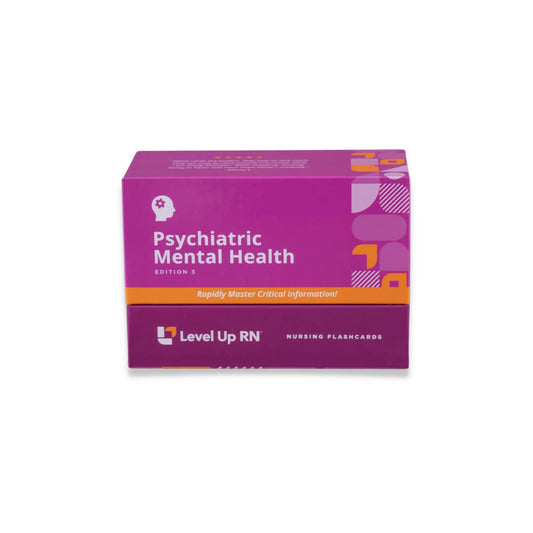Hi, I'm Cathy with Level Up RN. In this video, we will be discussing antipsychotic medications that are used in the treatment of schizophrenia. I will be discussing both first-generation and second-generation antipsychotics. And at the end of the video, I'm going to give you guys a little quiz to test your knowledge of some of the key points I'll be covering so definitely stay tuned for that. And if you have our Level Up RN, Psychiatric Mental Health Nursing flash cards, go ahead and pull out your flash cards that cover antipsychotic medications and follow along with me. First-generation or typical antipsychotic agents include medications such as chlorpromazine, haloperidol, and droperidol. These medications control the positive symptoms of schizophrenia. So these are things that are added to a person that should not be there. So this includes hallucinations and delusions. Our cool chicken hint to help you remember at least one of these medications is if you have hallucinations, then you might need haloperidol. First generation antipsychotics have many serious side effects. This includes extrapyramidal symptoms, or EPS, as well as neuroleptic malignant syndrome, or NMS, agranulocytosis, which means we have a decrease in white blood cells, orthostatic hypotension, anticholinergic effects, sedation, and seizures.
So out of that big list, the two that you really, really have to know include EPS and NMS. So, let's talk about some important points. You need to know about those two movement disorders. Extrapyramidal symptoms include dystonia, which are involuntary muscle contractions, akathisia, which is characterized by restlessness and repetitive movements, Parkinson's symptoms, such as muscle rigidity, tremors, and a shuffling gait, and tardive dyskinesia, which is characterized by involuntary movements of the tongue, neck, and facial muscles. Many of these extrapyramidal symptoms will resolve spontaneously or will resolve upon discontinuation of the medication. However, tardive dyskinesia is irreversible and symptoms will persist even after discontinuation of the medication. An anticholinergic medication such as benztropine can be used to help control the extrapyramidal symptoms associated with a typical antipsychotic agent. Neuroleptic malignant syndrome, or NMS, is a life-threatening condition caused by the use of an antipsychotic agent or withdraw from an antipsychotic agent. Symptoms include a high fever, muscle rigidity, decreased level of consciousness, arrhythmias, tachycardia, diaphoresis, as well as blood pressure fluctuations. Treatment of NMS includes discontinuation of the medication or restarting the medication if withdraw is what caused NMS. In addition, we want to administer dantrolene, which is a muscle relaxant, and implement cooling measures and make sure we stabilize our patient's electrolyte levels.
Let's now talk about second-generation or atypical antipsychotic agents. Medications that fall within this class include risperidone, olanzapine, and clozapine. These medications help to control the positive symptoms and the negative symptoms associated with schizophrenia. So as a review, positive symptoms are things that are added to a patient who has schizophrenia that should not be there, such as delusions and hallucinations. Negative symptoms are things that are taken away from a patient that should be there. So examples of negative symptoms include anhedonia, which means lack of pleasure, and anergia, which means lack of energy. I do want to note that clozapine and clonidine are two medications that are frequently confused. So our cool chicken hint to help you remember the difference is clozapine is for schizophrenia, both of those words have the letter Z, clonidine is a blood pressure medication and does not contain the letter Z so it is not for schizophrenia.
Unlike typical antipsychotic agents, atypical antipsychotic agents carry a much lower risk for EPS and NMS. However, they still have a lot of serious side effects. This includes an increased risk for type 2 diabetes, weight gain, elevated cholesterol, anticholinergic effects, decreased libido, sedation, and increased risk for seizures, neutropenia, as well as agranulocytosis, so a decrease in white blood cells. As the nurse caring for a patient who is taking an atypical antipsychotic agent, you want to monitor their blood glucose levels due to the risk for type 2 diabetes, and you also need to monitor for signs of infection due to the risk for neutropenia and agranulocytosis.
All right. It's quiz time. And this time I have five questions for you because there were a lot of key points that we covered in this video that you are very likely to get tested on in nursing school.
Question number 1. Blank is a life-threatening condition caused by first-generation antipsychotics, characterized by muscle rigidity, high fever, and cardiac arrhythmias.
The answer is neuroleptic malignant syndrome.
Question number 2. What medication can be used to reduce extrapyramidal symptoms in a patient taking a first-generation antipsychotic?
The answer is benztropine.
Question number 3. Risperidone places a patient at increased risk for type 2 diabetes, weight gain, and high cholesterol. True or false.
The answer is true.
Question number 4. What side effect of first-generation antipsychotics is characterized by involuntary movements of the tongue, neck, and facial muscles.
The answer is tardive dyskinesia.
Question number 5. What muscle relaxant is administered to a patient experiencing NMS?
The answer is dantrolene.
All right. I hope you found this video to be super helpful. If so, be sure to hit that Like button. Take care and thank you so much for watching.


